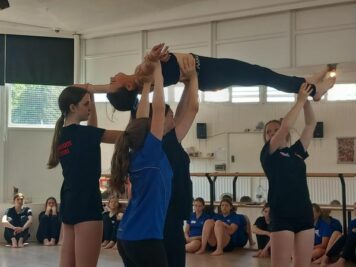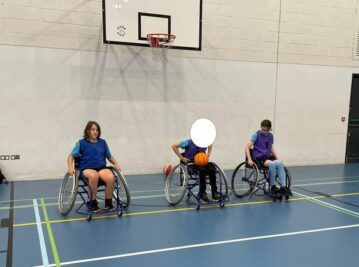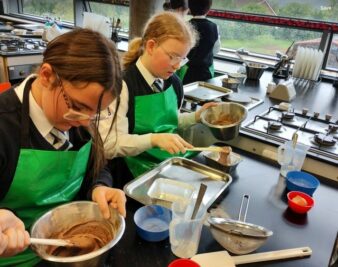Folkestone Academy has achieved the Inclusive School Award with Centre of Excellence status

Connected to the School
Folkestone Academy is an exceptional example of an inclusive secondary school. The sense of belonging to a caring community is evident throughout the school. Everyone connected to the school, whether pupils, parents or staff members are proud of the inclusive ethos and value the school greatly. It was a real pleasure to see the school in action and speak to so many enthusiastic and committed members of staff and pupils.
The school forms part of the five school Turner Schools Trust whose three commitments to pupils, families and schools are described as: Transforming Children’s Futures; Empowering Families; Strengthening Communities.
The recent Ofsted report (2022) described: (Leaders who) “are unwavering in their determination to ensure that pupils are provided with the very best education, particularly disadvantaged pupils and those with special educational needs and/or disabilities.”
The school’s philosophy is to ensure that all individuals have their barriers to learning removed so that they can enjoy and achieve during their time at the school. The school is non-selective in an area where the Kent Test operates. The school works tirelessly to instil in the children a love of learning with no sense of failure.
Highly-Skilled Staff

The school has very committed, highly skilled staff at all levels. Everyone spoken to has a very high level of professionalism, relishes developing their own skills and talks passionately about the inclusion journey of the school. It was very inspiring to meet everyone and hear about their work and enthusiasm for getting the children to go as far as possible, academically and socially.
Built on two floors, the building is a purpose-built, modern, open plan school where everyone is always visible. Children report that the building makes them feel safe because they can always see and be seen by an adult.
The transition process begins long before pupils join the school with the aim of making them feel excited and prepared for their new school. Year 5 and 6 pupils from primary schools take part in the Primary Olympics on the school grounds. The school has a very good understanding of all their pupils’ needs before they start at the school; all Year 6s are offered a five day summer school to address any preschool anxieties. This has proved very successful.
Pupils who are coming from small schools who may not know anyone else are given the opportunity to do extra transition sessions so that they can get to know each other as a group before starting at the school. All pupils have two days of transition which lead to a seamless admissions’ process. Staff meet new pupils in their primary schools and children with additional needs may have a bespoke programme.
The Director of Special Educational Needs and Disabilities (SEND) organises a cream tea in Year 7 so that the pupils can invite their primary Special Educational Needs
Co-ordinators (SENCos) into school to see how well they have settled in. This is a great idea as the pupils are proud of their progress.

Well Considered
Around 14 to 16 pupils, particularly vulnerable pupils, each year are placed in the school’s Nurture provision so that they make a smooth transition to their secondary education. They are taught as a small group for all subjects except the practical subjects.
Transition out of the school is also very successful and well considered. The school has forged very strong links with local colleges for children who choose to follow specialist courses in the Further Education (FE) sector rather than going to the school’s sixth form. One young person, who went to college returned to the school on work experience and is now the first apprentice that the school has employed.
Our Assessor had the opportunity to meet with seven pupils, ranging from Years 8, 9 and 12. They were all very articulate, polite and represented the school very well when talking about the school. Two sixth formers described how well equipped the school is with resources and specialist areas. They spoke about how easy it is for new pupils to find their way around the school. The two courtyards on both floors are used as eating areas/cafeteria space. There is also a picnic area to eat outside if pupils prefer this.
Sixth form pupils spoke about how they feel very well prepared for the next stage of their education, mentioning the comprehensive and very relevant careers programme.
All pupils were particularly appreciative of the wide range of clubs that are offered in the school. They said the school is very receptive if they want to introduce a new club to the programme. Turners’ Community Day is a new annual event where pupils from all age groups across the Trust spend the day doing something to give back to the community. One of the sixth form pupils gave an example of how pupils who attend choir club are given lots of opportunities to perform in front of the local community.
The same applies to the radio club which is the town’s radio station, based at the school, where pupils become regular radio presenters with lots of involvement in community events.
Inclusion Agenda

As part of the inclusion agenda, all pupils are given a Chromebook when they start at the school which is theirs to take home and use until they leave the school. Financial concerns do not prevent anyone from accessing Information Technology (IT); no one is left behind.
Timetables and pens are just two examples of things that are given to pupils who may have come to school without them so that their learning is not interrupted.
“Pupil voice is very influential in this school”. This was said by a Year 8 pupil as part of the pupil voice session. They described the student council and how the Senior Leadership Team (SLT) do a “you said/we did” response to their meetings. They had a large role to play in influencing the Trust to build the new horticulture provision.
If a pupil, for example, is physically unable to come to school, due to a short term physical issue, they attend the Turner online school as a short term measure. Pupils can also attend The Bridge project which is a halfway house provision for pupils who may be anxious about being in school.
One pupil spoke about his experiences on the Creative Arts scholarship programme. He loves the opportunity to explore art in more depth. He enjoyed the three day London residential where the group visited lots of art galleries in Year 7 and the trip to Margate for Year 8.
A Year 8 class was observed taking part in a Votes 4 Schools session during their tutor time. Pupils engaged well in the starter activity about what they would take if they had to flee their home to a place of safety. They fed back to a partner and were interested in each other’s responses. This led on to the question that they would vote on later, “Has the Ukraine war changed our perception of refugees?”
Free Hands

It was also interesting to see how the pupils responded to the teacher’s prompts such as “free hands” to put their pens down, “reset” or “you know our expectations,” to gain their attention etc. These prompts are consistent throughout the school so that pupils who find change difficult can get a sense of continuity and have a reduction in their anxiety.
Each pupil has their own pupil passport with start and end dates for intervention strategies etc. which is shared with all staff.
Pupils were excited about their upcoming Turner Schools Art Exhibition which will involve artwork from all the pupils and staff. The pupils are looking forward to coming with their parents.
Find out more about the IQM Inclusive School Award
If your school is interested in obtaining the IQM Inclusive School Award or you wish to talk to a member of the IQM team please telephone:
028 7127 7857 (9.00 am to 5.00 pm)
or email: [email protected] for further details.
Want more information on the IQM Award? Click here to request your free IQM information pack